Professional Identity 92434 Case Study: Ethical and Legal Frameworks
VerifiedAdded on 2022/11/15
|7
|2256
|155
Case Study
AI Summary
This case study examines a complex ethical dilemma in nursing practice, specifically addressing the scenario of a nursing professional, Sam, dealing with an adolescent patient, Jessica, who is apprehensive about her pregnancy and unwilling to share this information. The assignment delves into the ethical considerations of beneficence, non-maleficence, and autonomy, as well as the legal aspects related to informed consent and patient confidentiality, particularly concerning adolescents. The analysis incorporates the Nursing and Midwifery Board of Australia's (NMBA) code of ethics and code of conduct, along with relevant legal frameworks from the NSW Health Policy. The student explores different options for handling the situation, weighing the ethical implications of each approach and ultimately advocating for a course of action that prioritizes Jessica's well-being while respecting her autonomy, emphasizing the importance of building trust and obtaining informed consent. The assignment also discusses the Gillick competence framework to assess Jessica's capacity to make informed decisions. The student provides references to support their arguments, including relevant literature on adolescent health, confidentiality, and ethical principles in nursing.
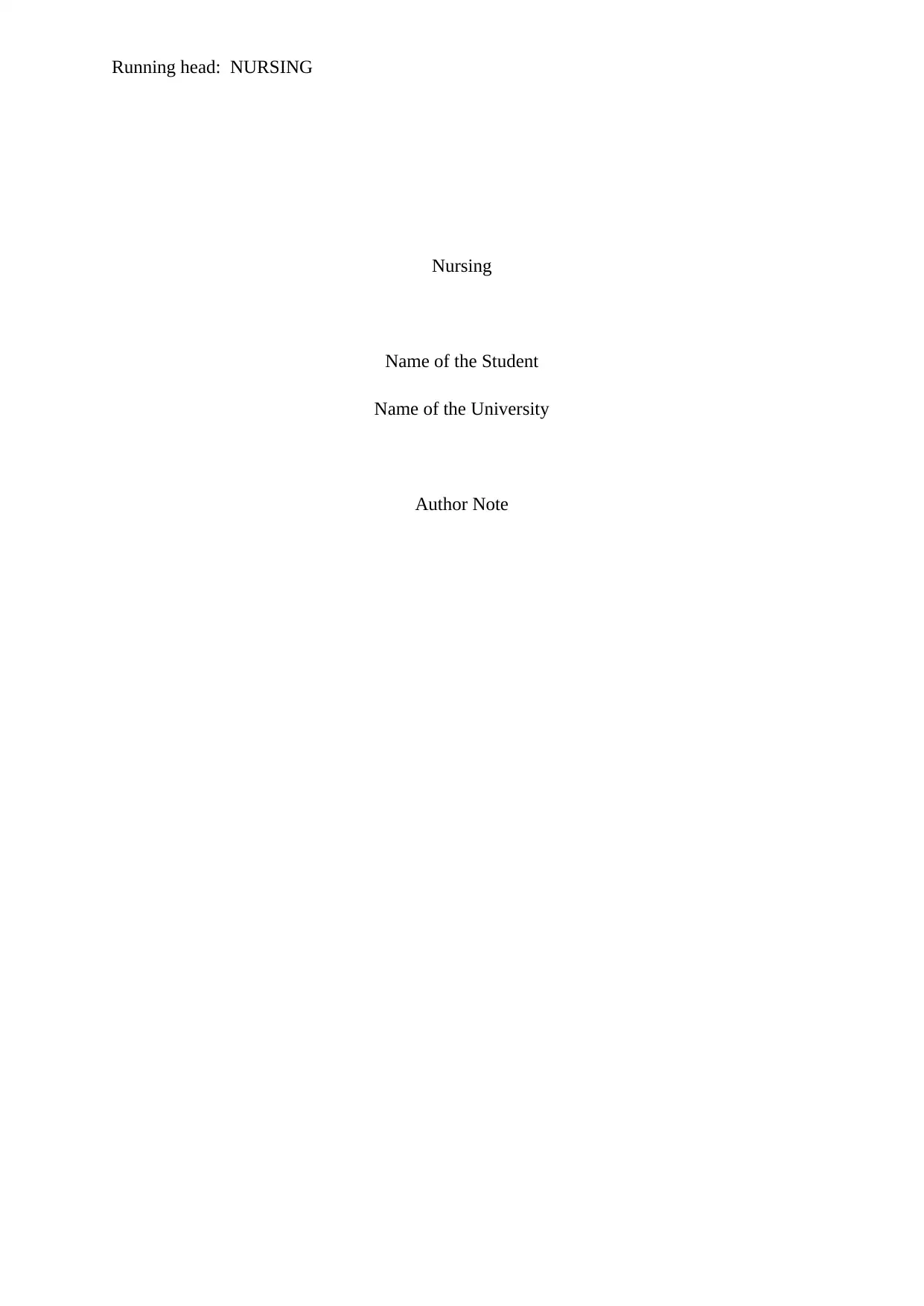
Running head: NURSING
Nursing
Name of the Student
Name of the University
Author Note
Nursing
Name of the Student
Name of the University
Author Note
Paraphrase This Document
Need a fresh take? Get an instant paraphrase of this document with our AI Paraphraser
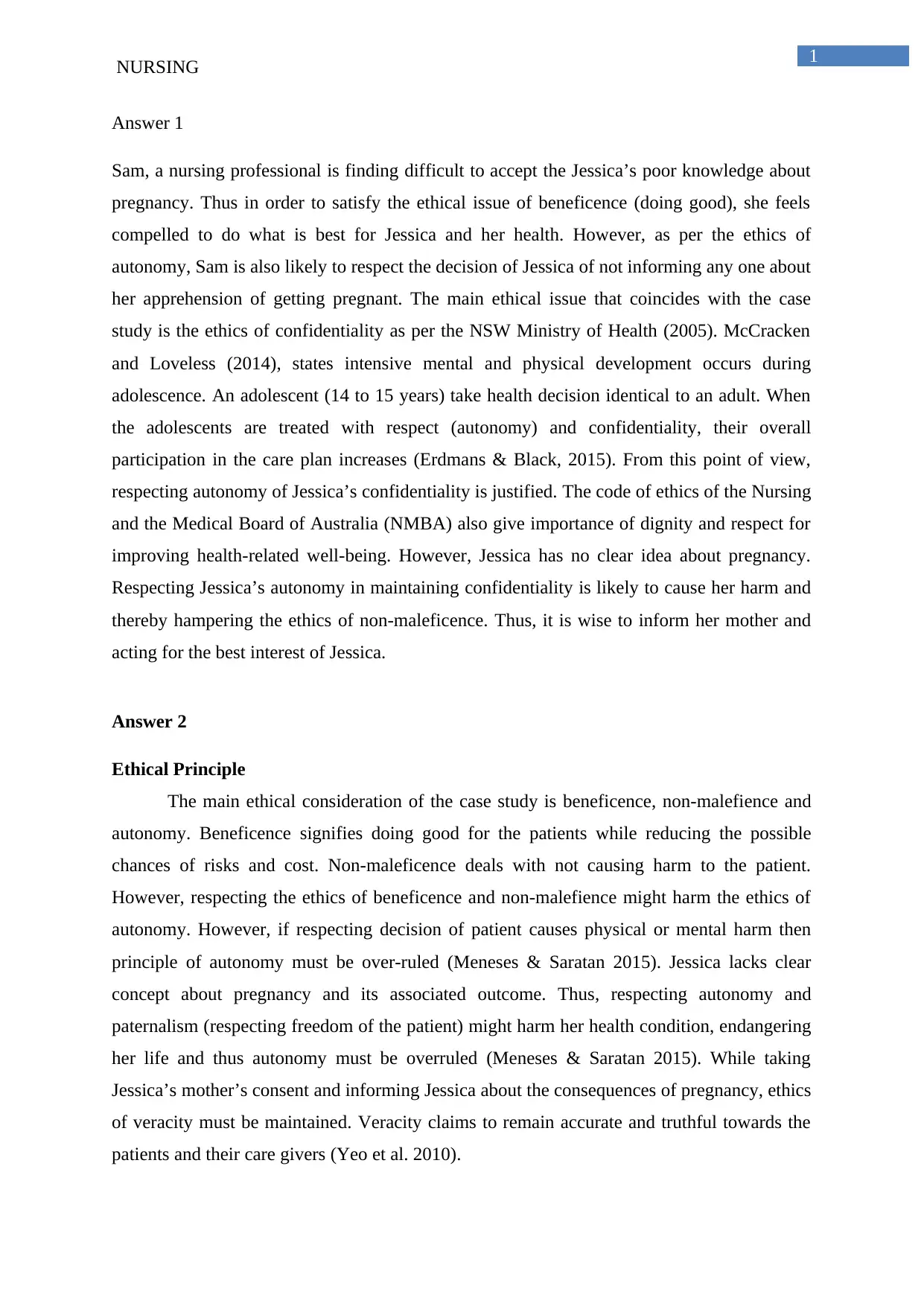
1
NURSING
Answer 1
Sam, a nursing professional is finding difficult to accept the Jessica’s poor knowledge about
pregnancy. Thus in order to satisfy the ethical issue of beneficence (doing good), she feels
compelled to do what is best for Jessica and her health. However, as per the ethics of
autonomy, Sam is also likely to respect the decision of Jessica of not informing any one about
her apprehension of getting pregnant. The main ethical issue that coincides with the case
study is the ethics of confidentiality as per the NSW Ministry of Health (2005). McCracken
and Loveless (2014), states intensive mental and physical development occurs during
adolescence. An adolescent (14 to 15 years) take health decision identical to an adult. When
the adolescents are treated with respect (autonomy) and confidentiality, their overall
participation in the care plan increases (Erdmans & Black, 2015). From this point of view,
respecting autonomy of Jessica’s confidentiality is justified. The code of ethics of the Nursing
and the Medical Board of Australia (NMBA) also give importance of dignity and respect for
improving health-related well-being. However, Jessica has no clear idea about pregnancy.
Respecting Jessica’s autonomy in maintaining confidentiality is likely to cause her harm and
thereby hampering the ethics of non-maleficence. Thus, it is wise to inform her mother and
acting for the best interest of Jessica.
Answer 2
Ethical Principle
The main ethical consideration of the case study is beneficence, non-malefience and
autonomy. Beneficence signifies doing good for the patients while reducing the possible
chances of risks and cost. Non-maleficence deals with not causing harm to the patient.
However, respecting the ethics of beneficence and non-malefience might harm the ethics of
autonomy. However, if respecting decision of patient causes physical or mental harm then
principle of autonomy must be over-ruled (Meneses & Saratan 2015). Jessica lacks clear
concept about pregnancy and its associated outcome. Thus, respecting autonomy and
paternalism (respecting freedom of the patient) might harm her health condition, endangering
her life and thus autonomy must be overruled (Meneses & Saratan 2015). While taking
Jessica’s mother’s consent and informing Jessica about the consequences of pregnancy, ethics
of veracity must be maintained. Veracity claims to remain accurate and truthful towards the
patients and their care givers (Yeo et al. 2010).
NURSING
Answer 1
Sam, a nursing professional is finding difficult to accept the Jessica’s poor knowledge about
pregnancy. Thus in order to satisfy the ethical issue of beneficence (doing good), she feels
compelled to do what is best for Jessica and her health. However, as per the ethics of
autonomy, Sam is also likely to respect the decision of Jessica of not informing any one about
her apprehension of getting pregnant. The main ethical issue that coincides with the case
study is the ethics of confidentiality as per the NSW Ministry of Health (2005). McCracken
and Loveless (2014), states intensive mental and physical development occurs during
adolescence. An adolescent (14 to 15 years) take health decision identical to an adult. When
the adolescents are treated with respect (autonomy) and confidentiality, their overall
participation in the care plan increases (Erdmans & Black, 2015). From this point of view,
respecting autonomy of Jessica’s confidentiality is justified. The code of ethics of the Nursing
and the Medical Board of Australia (NMBA) also give importance of dignity and respect for
improving health-related well-being. However, Jessica has no clear idea about pregnancy.
Respecting Jessica’s autonomy in maintaining confidentiality is likely to cause her harm and
thereby hampering the ethics of non-maleficence. Thus, it is wise to inform her mother and
acting for the best interest of Jessica.
Answer 2
Ethical Principle
The main ethical consideration of the case study is beneficence, non-malefience and
autonomy. Beneficence signifies doing good for the patients while reducing the possible
chances of risks and cost. Non-maleficence deals with not causing harm to the patient.
However, respecting the ethics of beneficence and non-malefience might harm the ethics of
autonomy. However, if respecting decision of patient causes physical or mental harm then
principle of autonomy must be over-ruled (Meneses & Saratan 2015). Jessica lacks clear
concept about pregnancy and its associated outcome. Thus, respecting autonomy and
paternalism (respecting freedom of the patient) might harm her health condition, endangering
her life and thus autonomy must be overruled (Meneses & Saratan 2015). While taking
Jessica’s mother’s consent and informing Jessica about the consequences of pregnancy, ethics
of veracity must be maintained. Veracity claims to remain accurate and truthful towards the
patients and their care givers (Yeo et al. 2010).
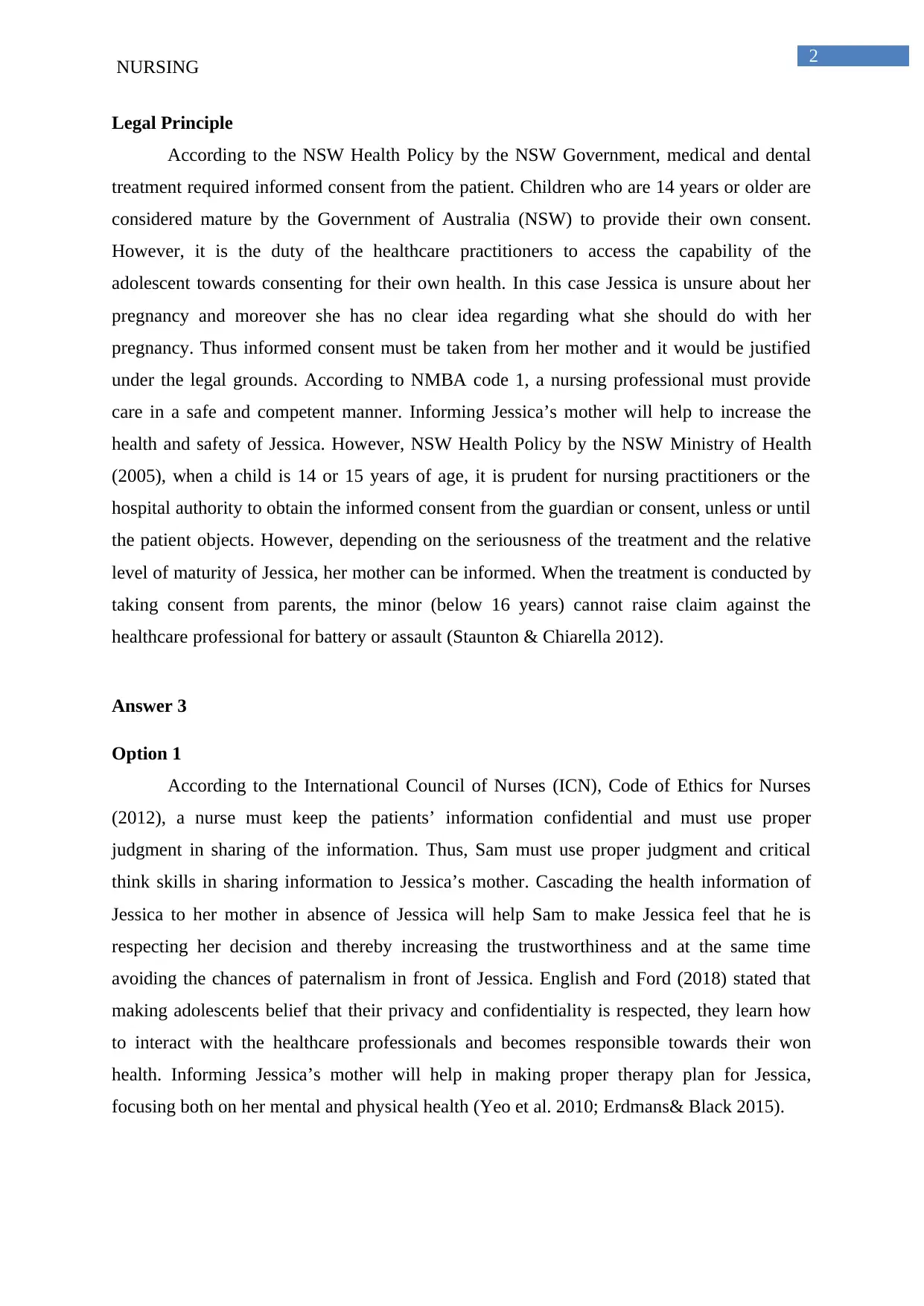
2
NURSING
Legal Principle
According to the NSW Health Policy by the NSW Government, medical and dental
treatment required informed consent from the patient. Children who are 14 years or older are
considered mature by the Government of Australia (NSW) to provide their own consent.
However, it is the duty of the healthcare practitioners to access the capability of the
adolescent towards consenting for their own health. In this case Jessica is unsure about her
pregnancy and moreover she has no clear idea regarding what she should do with her
pregnancy. Thus informed consent must be taken from her mother and it would be justified
under the legal grounds. According to NMBA code 1, a nursing professional must provide
care in a safe and competent manner. Informing Jessica’s mother will help to increase the
health and safety of Jessica. However, NSW Health Policy by the NSW Ministry of Health
(2005), when a child is 14 or 15 years of age, it is prudent for nursing practitioners or the
hospital authority to obtain the informed consent from the guardian or consent, unless or until
the patient objects. However, depending on the seriousness of the treatment and the relative
level of maturity of Jessica, her mother can be informed. When the treatment is conducted by
taking consent from parents, the minor (below 16 years) cannot raise claim against the
healthcare professional for battery or assault (Staunton & Chiarella 2012).
Answer 3
Option 1
According to the International Council of Nurses (ICN), Code of Ethics for Nurses
(2012), a nurse must keep the patients’ information confidential and must use proper
judgment in sharing of the information. Thus, Sam must use proper judgment and critical
think skills in sharing information to Jessica’s mother. Cascading the health information of
Jessica to her mother in absence of Jessica will help Sam to make Jessica feel that he is
respecting her decision and thereby increasing the trustworthiness and at the same time
avoiding the chances of paternalism in front of Jessica. English and Ford (2018) stated that
making adolescents belief that their privacy and confidentiality is respected, they learn how
to interact with the healthcare professionals and becomes responsible towards their won
health. Informing Jessica’s mother will help in making proper therapy plan for Jessica,
focusing both on her mental and physical health (Yeo et al. 2010; Erdmans& Black 2015).
NURSING
Legal Principle
According to the NSW Health Policy by the NSW Government, medical and dental
treatment required informed consent from the patient. Children who are 14 years or older are
considered mature by the Government of Australia (NSW) to provide their own consent.
However, it is the duty of the healthcare practitioners to access the capability of the
adolescent towards consenting for their own health. In this case Jessica is unsure about her
pregnancy and moreover she has no clear idea regarding what she should do with her
pregnancy. Thus informed consent must be taken from her mother and it would be justified
under the legal grounds. According to NMBA code 1, a nursing professional must provide
care in a safe and competent manner. Informing Jessica’s mother will help to increase the
health and safety of Jessica. However, NSW Health Policy by the NSW Ministry of Health
(2005), when a child is 14 or 15 years of age, it is prudent for nursing practitioners or the
hospital authority to obtain the informed consent from the guardian or consent, unless or until
the patient objects. However, depending on the seriousness of the treatment and the relative
level of maturity of Jessica, her mother can be informed. When the treatment is conducted by
taking consent from parents, the minor (below 16 years) cannot raise claim against the
healthcare professional for battery or assault (Staunton & Chiarella 2012).
Answer 3
Option 1
According to the International Council of Nurses (ICN), Code of Ethics for Nurses
(2012), a nurse must keep the patients’ information confidential and must use proper
judgment in sharing of the information. Thus, Sam must use proper judgment and critical
think skills in sharing information to Jessica’s mother. Cascading the health information of
Jessica to her mother in absence of Jessica will help Sam to make Jessica feel that he is
respecting her decision and thereby increasing the trustworthiness and at the same time
avoiding the chances of paternalism in front of Jessica. English and Ford (2018) stated that
making adolescents belief that their privacy and confidentiality is respected, they learn how
to interact with the healthcare professionals and becomes responsible towards their won
health. Informing Jessica’s mother will help in making proper therapy plan for Jessica,
focusing both on her mental and physical health (Yeo et al. 2010; Erdmans& Black 2015).
⊘ This is a preview!⊘
Do you want full access?
Subscribe today to unlock all pages.

Trusted by 1+ million students worldwide
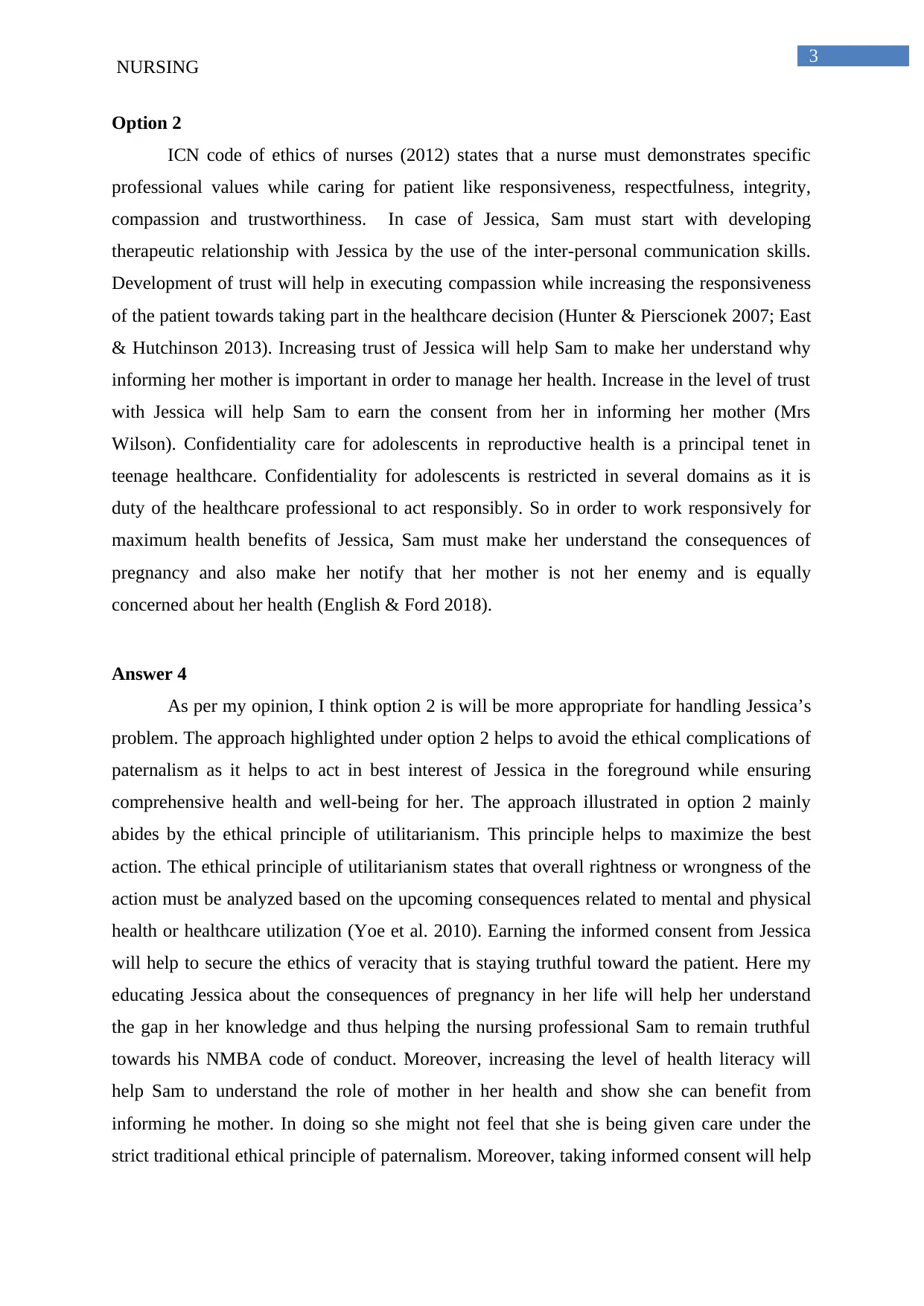
3
NURSING
Option 2
ICN code of ethics of nurses (2012) states that a nurse must demonstrates specific
professional values while caring for patient like responsiveness, respectfulness, integrity,
compassion and trustworthiness. In case of Jessica, Sam must start with developing
therapeutic relationship with Jessica by the use of the inter-personal communication skills.
Development of trust will help in executing compassion while increasing the responsiveness
of the patient towards taking part in the healthcare decision (Hunter & Pierscionek 2007; East
& Hutchinson 2013). Increasing trust of Jessica will help Sam to make her understand why
informing her mother is important in order to manage her health. Increase in the level of trust
with Jessica will help Sam to earn the consent from her in informing her mother (Mrs
Wilson). Confidentiality care for adolescents in reproductive health is a principal tenet in
teenage healthcare. Confidentiality for adolescents is restricted in several domains as it is
duty of the healthcare professional to act responsibly. So in order to work responsively for
maximum health benefits of Jessica, Sam must make her understand the consequences of
pregnancy and also make her notify that her mother is not her enemy and is equally
concerned about her health (English & Ford 2018).
Answer 4
As per my opinion, I think option 2 is will be more appropriate for handling Jessica’s
problem. The approach highlighted under option 2 helps to avoid the ethical complications of
paternalism as it helps to act in best interest of Jessica in the foreground while ensuring
comprehensive health and well-being for her. The approach illustrated in option 2 mainly
abides by the ethical principle of utilitarianism. This principle helps to maximize the best
action. The ethical principle of utilitarianism states that overall rightness or wrongness of the
action must be analyzed based on the upcoming consequences related to mental and physical
health or healthcare utilization (Yoe et al. 2010). Earning the informed consent from Jessica
will help to secure the ethics of veracity that is staying truthful toward the patient. Here my
educating Jessica about the consequences of pregnancy in her life will help her understand
the gap in her knowledge and thus helping the nursing professional Sam to remain truthful
towards his NMBA code of conduct. Moreover, increasing the level of health literacy will
help Sam to understand the role of mother in her health and show she can benefit from
informing he mother. In doing so she might not feel that she is being given care under the
strict traditional ethical principle of paternalism. Moreover, taking informed consent will help
NURSING
Option 2
ICN code of ethics of nurses (2012) states that a nurse must demonstrates specific
professional values while caring for patient like responsiveness, respectfulness, integrity,
compassion and trustworthiness. In case of Jessica, Sam must start with developing
therapeutic relationship with Jessica by the use of the inter-personal communication skills.
Development of trust will help in executing compassion while increasing the responsiveness
of the patient towards taking part in the healthcare decision (Hunter & Pierscionek 2007; East
& Hutchinson 2013). Increasing trust of Jessica will help Sam to make her understand why
informing her mother is important in order to manage her health. Increase in the level of trust
with Jessica will help Sam to earn the consent from her in informing her mother (Mrs
Wilson). Confidentiality care for adolescents in reproductive health is a principal tenet in
teenage healthcare. Confidentiality for adolescents is restricted in several domains as it is
duty of the healthcare professional to act responsibly. So in order to work responsively for
maximum health benefits of Jessica, Sam must make her understand the consequences of
pregnancy and also make her notify that her mother is not her enemy and is equally
concerned about her health (English & Ford 2018).
Answer 4
As per my opinion, I think option 2 is will be more appropriate for handling Jessica’s
problem. The approach highlighted under option 2 helps to avoid the ethical complications of
paternalism as it helps to act in best interest of Jessica in the foreground while ensuring
comprehensive health and well-being for her. The approach illustrated in option 2 mainly
abides by the ethical principle of utilitarianism. This principle helps to maximize the best
action. The ethical principle of utilitarianism states that overall rightness or wrongness of the
action must be analyzed based on the upcoming consequences related to mental and physical
health or healthcare utilization (Yoe et al. 2010). Earning the informed consent from Jessica
will help to secure the ethics of veracity that is staying truthful toward the patient. Here my
educating Jessica about the consequences of pregnancy in her life will help her understand
the gap in her knowledge and thus helping the nursing professional Sam to remain truthful
towards his NMBA code of conduct. Moreover, increasing the level of health literacy will
help Sam to understand the role of mother in her health and show she can benefit from
informing he mother. In doing so she might not feel that she is being given care under the
strict traditional ethical principle of paternalism. Moreover, taking informed consent will help
Paraphrase This Document
Need a fresh take? Get an instant paraphrase of this document with our AI Paraphraser
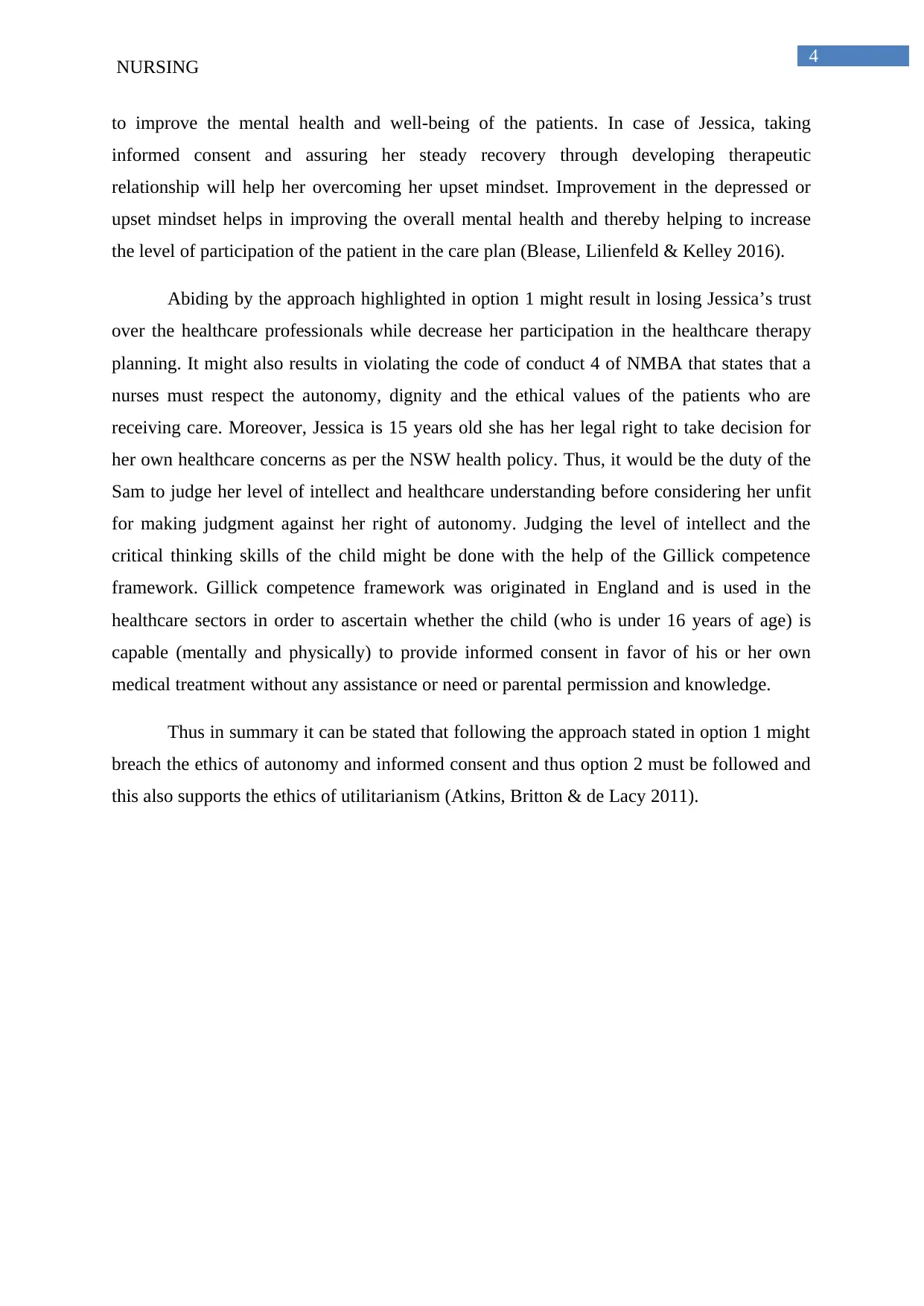
4
NURSING
to improve the mental health and well-being of the patients. In case of Jessica, taking
informed consent and assuring her steady recovery through developing therapeutic
relationship will help her overcoming her upset mindset. Improvement in the depressed or
upset mindset helps in improving the overall mental health and thereby helping to increase
the level of participation of the patient in the care plan (Blease, Lilienfeld & Kelley 2016).
Abiding by the approach highlighted in option 1 might result in losing Jessica’s trust
over the healthcare professionals while decrease her participation in the healthcare therapy
planning. It might also results in violating the code of conduct 4 of NMBA that states that a
nurses must respect the autonomy, dignity and the ethical values of the patients who are
receiving care. Moreover, Jessica is 15 years old she has her legal right to take decision for
her own healthcare concerns as per the NSW health policy. Thus, it would be the duty of the
Sam to judge her level of intellect and healthcare understanding before considering her unfit
for making judgment against her right of autonomy. Judging the level of intellect and the
critical thinking skills of the child might be done with the help of the Gillick competence
framework. Gillick competence framework was originated in England and is used in the
healthcare sectors in order to ascertain whether the child (who is under 16 years of age) is
capable (mentally and physically) to provide informed consent in favor of his or her own
medical treatment without any assistance or need or parental permission and knowledge.
Thus in summary it can be stated that following the approach stated in option 1 might
breach the ethics of autonomy and informed consent and thus option 2 must be followed and
this also supports the ethics of utilitarianism (Atkins, Britton & de Lacy 2011).
NURSING
to improve the mental health and well-being of the patients. In case of Jessica, taking
informed consent and assuring her steady recovery through developing therapeutic
relationship will help her overcoming her upset mindset. Improvement in the depressed or
upset mindset helps in improving the overall mental health and thereby helping to increase
the level of participation of the patient in the care plan (Blease, Lilienfeld & Kelley 2016).
Abiding by the approach highlighted in option 1 might result in losing Jessica’s trust
over the healthcare professionals while decrease her participation in the healthcare therapy
planning. It might also results in violating the code of conduct 4 of NMBA that states that a
nurses must respect the autonomy, dignity and the ethical values of the patients who are
receiving care. Moreover, Jessica is 15 years old she has her legal right to take decision for
her own healthcare concerns as per the NSW health policy. Thus, it would be the duty of the
Sam to judge her level of intellect and healthcare understanding before considering her unfit
for making judgment against her right of autonomy. Judging the level of intellect and the
critical thinking skills of the child might be done with the help of the Gillick competence
framework. Gillick competence framework was originated in England and is used in the
healthcare sectors in order to ascertain whether the child (who is under 16 years of age) is
capable (mentally and physically) to provide informed consent in favor of his or her own
medical treatment without any assistance or need or parental permission and knowledge.
Thus in summary it can be stated that following the approach stated in option 1 might
breach the ethics of autonomy and informed consent and thus option 2 must be followed and
this also supports the ethics of utilitarianism (Atkins, Britton & de Lacy 2011).
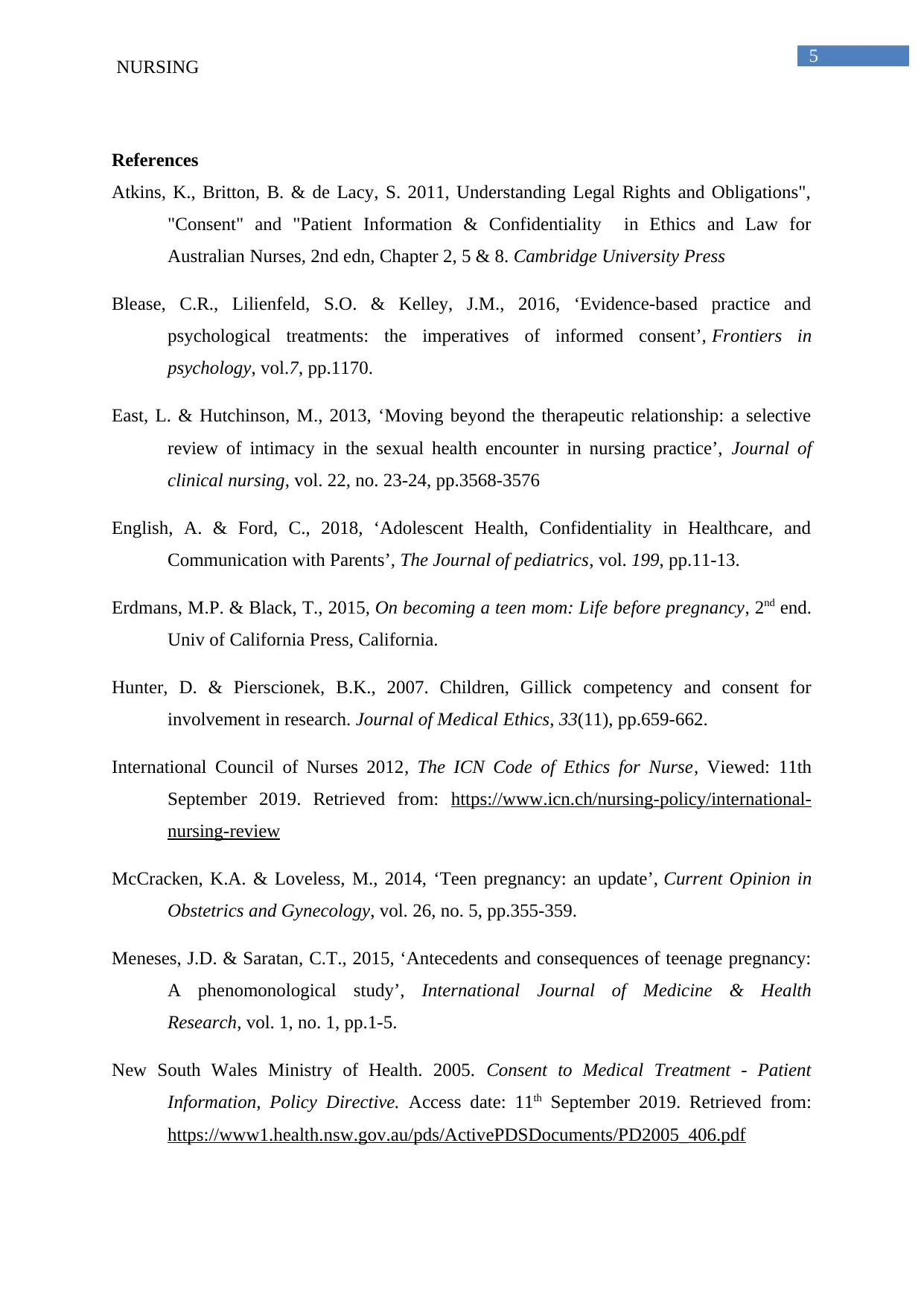
5
NURSING
References
Atkins, K., Britton, B. & de Lacy, S. 2011, Understanding Legal Rights and Obligations",
"Consent" and "Patient Information & Confidentiality in Ethics and Law for
Australian Nurses, 2nd edn, Chapter 2, 5 & 8. Cambridge University Press
Blease, C.R., Lilienfeld, S.O. & Kelley, J.M., 2016, ‘Evidence-based practice and
psychological treatments: the imperatives of informed consent’, Frontiers in
psychology, vol.7, pp.1170.
East, L. & Hutchinson, M., 2013, ‘Moving beyond the therapeutic relationship: a selective
review of intimacy in the sexual health encounter in nursing practice’, Journal of
clinical nursing, vol. 22, no. 23-24, pp.3568-3576
English, A. & Ford, C., 2018, ‘Adolescent Health, Confidentiality in Healthcare, and
Communication with Parents’, The Journal of pediatrics, vol. 199, pp.11-13.
Erdmans, M.P. & Black, T., 2015, On becoming a teen mom: Life before pregnancy, 2nd end.
Univ of California Press, California.
Hunter, D. & Pierscionek, B.K., 2007. Children, Gillick competency and consent for
involvement in research. Journal of Medical Ethics, 33(11), pp.659-662.
International Council of Nurses 2012, The ICN Code of Ethics for Nurse, Viewed: 11th
September 2019. Retrieved from: https://www.icn.ch/nursing-policy/international-
nursing-review
McCracken, K.A. & Loveless, M., 2014, ‘Teen pregnancy: an update’, Current Opinion in
Obstetrics and Gynecology, vol. 26, no. 5, pp.355-359.
Meneses, J.D. & Saratan, C.T., 2015, ‘Antecedents and consequences of teenage pregnancy:
A phenomonological study’, International Journal of Medicine & Health
Research, vol. 1, no. 1, pp.1-5.
New South Wales Ministry of Health. 2005. Consent to Medical Treatment - Patient
Information, Policy Directive. Access date: 11th September 2019. Retrieved from:
https://www1.health.nsw.gov.au/pds/ActivePDSDocuments/PD2005_406.pdf
NURSING
References
Atkins, K., Britton, B. & de Lacy, S. 2011, Understanding Legal Rights and Obligations",
"Consent" and "Patient Information & Confidentiality in Ethics and Law for
Australian Nurses, 2nd edn, Chapter 2, 5 & 8. Cambridge University Press
Blease, C.R., Lilienfeld, S.O. & Kelley, J.M., 2016, ‘Evidence-based practice and
psychological treatments: the imperatives of informed consent’, Frontiers in
psychology, vol.7, pp.1170.
East, L. & Hutchinson, M., 2013, ‘Moving beyond the therapeutic relationship: a selective
review of intimacy in the sexual health encounter in nursing practice’, Journal of
clinical nursing, vol. 22, no. 23-24, pp.3568-3576
English, A. & Ford, C., 2018, ‘Adolescent Health, Confidentiality in Healthcare, and
Communication with Parents’, The Journal of pediatrics, vol. 199, pp.11-13.
Erdmans, M.P. & Black, T., 2015, On becoming a teen mom: Life before pregnancy, 2nd end.
Univ of California Press, California.
Hunter, D. & Pierscionek, B.K., 2007. Children, Gillick competency and consent for
involvement in research. Journal of Medical Ethics, 33(11), pp.659-662.
International Council of Nurses 2012, The ICN Code of Ethics for Nurse, Viewed: 11th
September 2019. Retrieved from: https://www.icn.ch/nursing-policy/international-
nursing-review
McCracken, K.A. & Loveless, M., 2014, ‘Teen pregnancy: an update’, Current Opinion in
Obstetrics and Gynecology, vol. 26, no. 5, pp.355-359.
Meneses, J.D. & Saratan, C.T., 2015, ‘Antecedents and consequences of teenage pregnancy:
A phenomonological study’, International Journal of Medicine & Health
Research, vol. 1, no. 1, pp.1-5.
New South Wales Ministry of Health. 2005. Consent to Medical Treatment - Patient
Information, Policy Directive. Access date: 11th September 2019. Retrieved from:
https://www1.health.nsw.gov.au/pds/ActivePDSDocuments/PD2005_406.pdf
⊘ This is a preview!⊘
Do you want full access?
Subscribe today to unlock all pages.

Trusted by 1+ million students worldwide
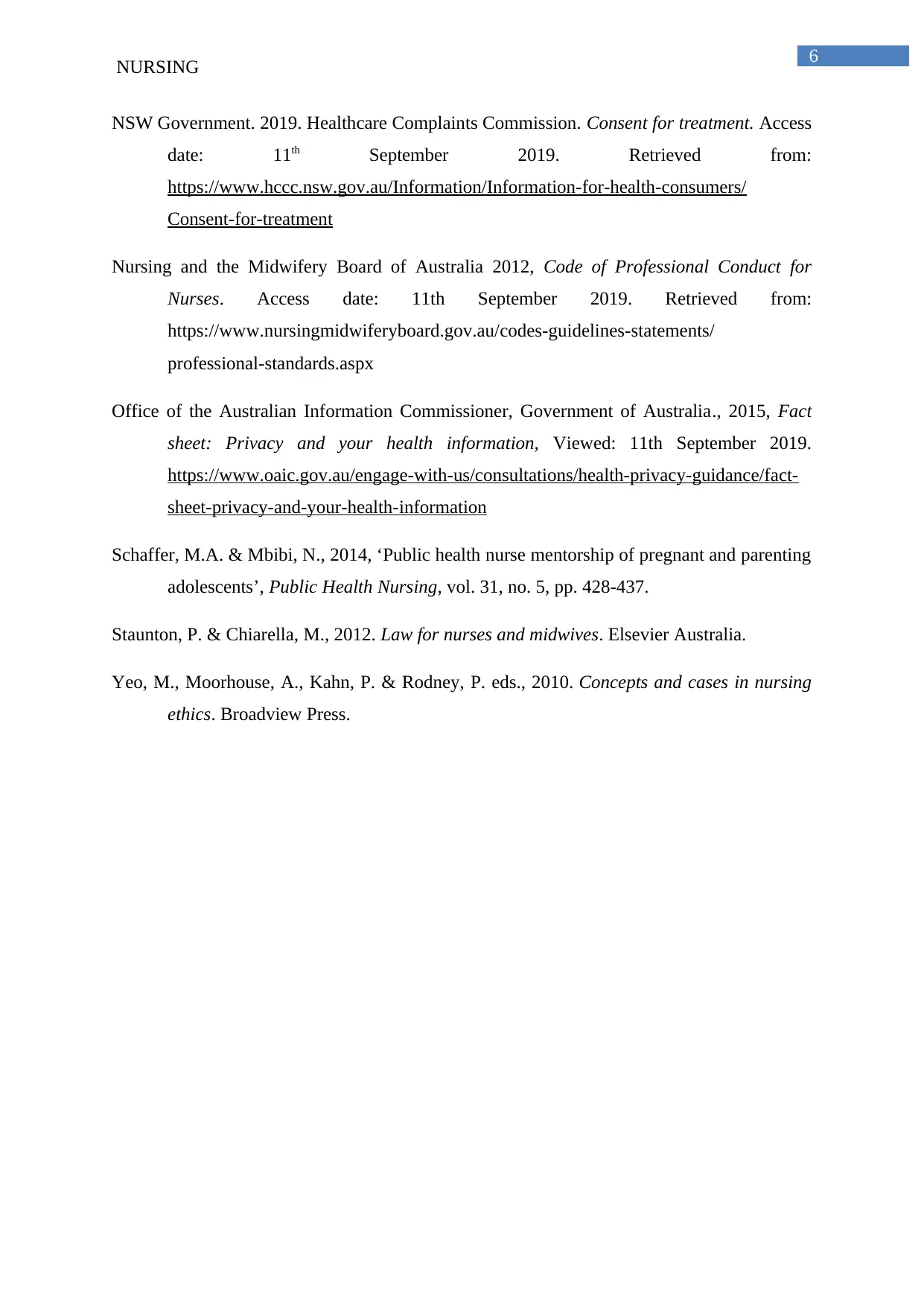
6
NURSING
NSW Government. 2019. Healthcare Complaints Commission. Consent for treatment. Access
date: 11th September 2019. Retrieved from:
https://www.hccc.nsw.gov.au/Information/Information-for-health-consumers/
Consent-for-treatment
Nursing and the Midwifery Board of Australia 2012, Code of Professional Conduct for
Nurses. Access date: 11th September 2019. Retrieved from:
https://www.nursingmidwiferyboard.gov.au/codes-guidelines-statements/
professional-standards.aspx
Office of the Australian Information Commissioner, Government of Australia., 2015, Fact
sheet: Privacy and your health information, Viewed: 11th September 2019.
https://www.oaic.gov.au/engage-with-us/consultations/health-privacy-guidance/fact-
sheet-privacy-and-your-health-information
Schaffer, M.A. & Mbibi, N., 2014, ‘Public health nurse mentorship of pregnant and parenting
adolescents’, Public Health Nursing, vol. 31, no. 5, pp. 428-437.
Staunton, P. & Chiarella, M., 2012. Law for nurses and midwives. Elsevier Australia.
Yeo, M., Moorhouse, A., Kahn, P. & Rodney, P. eds., 2010. Concepts and cases in nursing
ethics. Broadview Press.
NURSING
NSW Government. 2019. Healthcare Complaints Commission. Consent for treatment. Access
date: 11th September 2019. Retrieved from:
https://www.hccc.nsw.gov.au/Information/Information-for-health-consumers/
Consent-for-treatment
Nursing and the Midwifery Board of Australia 2012, Code of Professional Conduct for
Nurses. Access date: 11th September 2019. Retrieved from:
https://www.nursingmidwiferyboard.gov.au/codes-guidelines-statements/
professional-standards.aspx
Office of the Australian Information Commissioner, Government of Australia., 2015, Fact
sheet: Privacy and your health information, Viewed: 11th September 2019.
https://www.oaic.gov.au/engage-with-us/consultations/health-privacy-guidance/fact-
sheet-privacy-and-your-health-information
Schaffer, M.A. & Mbibi, N., 2014, ‘Public health nurse mentorship of pregnant and parenting
adolescents’, Public Health Nursing, vol. 31, no. 5, pp. 428-437.
Staunton, P. & Chiarella, M., 2012. Law for nurses and midwives. Elsevier Australia.
Yeo, M., Moorhouse, A., Kahn, P. & Rodney, P. eds., 2010. Concepts and cases in nursing
ethics. Broadview Press.
1 out of 7
Related Documents
Your All-in-One AI-Powered Toolkit for Academic Success.
+13062052269
info@desklib.com
Available 24*7 on WhatsApp / Email
![[object Object]](/_next/static/media/star-bottom.7253800d.svg)
Unlock your academic potential
Copyright © 2020–2026 A2Z Services. All Rights Reserved. Developed and managed by ZUCOL.




